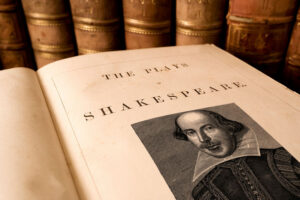

Defining a liberal arts education is tricky. Course options range depending on the program, and with such a broad range of studies, many universities offer different courses depending on the term. Many of these courses will provide specialists the opportunity to teach about niche topics; think narrative writing through imitation, learning about how the brain learns (and acquiring better study and work habits as a result), and how early photographs captured frontier life in the American west.
In general, most liberal arts programs will require that you learn about humanity through subjects like sociology, history, the arts, and global studies. And a big part of what makes us human is how we convey ideas and stories to one another through literature.
Why Consider a Degree in Liberal Studies Over a Straight English Degree
 While a master’s of English is a good option for those who want to specialize in one particular time period or genre of literature, your English coursework in the context of a liberal arts degree will teach you how to use the close-reading, analysis, pattern-seeking, and inferencing skills that you’d learn in a literature course and apply them to broader conversations about cultures and civilizations, from the past to the present.
While a master’s of English is a good option for those who want to specialize in one particular time period or genre of literature, your English coursework in the context of a liberal arts degree will teach you how to use the close-reading, analysis, pattern-seeking, and inferencing skills that you’d learn in a literature course and apply them to broader conversations about cultures and civilizations, from the past to the present.
Many master’s in English literature programs will also have you write in ways that are largely analytical, constructing comparative essays that examine the patterns of language across literature.
But a Master of Liberal Arts will also give you the opportunity to explore writing for other purposes, re-examining not just how we write, but why we write.
Liberal Studies Looks at Literature As a Way of Capturing Culture
 For centuries, poetry, plays, lyrics, and more recently, novels, have been a mechanism for thinkers and truth-seekers to explore and convey their ideas. When we look at literature from a particular time period or within a particular topic or genre, we can compare and contrast how those authors interpret and portray the issues that they’re writing about. Then, we can gain a greater understanding of that particular time period or topic.
For centuries, poetry, plays, lyrics, and more recently, novels, have been a mechanism for thinkers and truth-seekers to explore and convey their ideas. When we look at literature from a particular time period or within a particular topic or genre, we can compare and contrast how those authors interpret and portray the issues that they’re writing about. Then, we can gain a greater understanding of that particular time period or topic.
You may take a seminar class on Victorian-era novelists...
which focuses on how female writers of that setting experienced urbanization and industrialization.
In a course about adolescent literature...
you’ll explore texts from the young adult literary canon like The Catcher in the Rye as well as contemporary texts in the YA genre, analyzing how film and culture frame discourses of the adolescent experience.
You may take a seminar class on Victorian-era novelists...
which focuses on how female writers of that setting experienced urbanization and industrialization.
In a writing assignment drawing parallels to current events...
you may explore how a particular novel captures the deeply religious and anxious society of the times to understand the daily life of a woman in Victorian-era England.
By studying English literature in the context of a liberal arts degree, you will examine how literature becomes a way of representing culture, but also how culture manifests itself through literature.
English in Liberal Arts Encourages Writing for Many Purposes and In Many Genres
Your English courses in the liberal arts degree will not only offer seminars about literature, but they will also offer workshops about writing. Students in a liberal arts degree program will often come from a variety of backgrounds, and they will be earning their liberal arts degree for different purposes; therefore, your writing courses will offer opportunities for all students to approach writing in ways that are creative and relevant to them, while still being instructive.
For instance, in a course like Digital Storytelling, you’ll explore the pillars of engaging narratives, applying these pillars to the context of technology and exploring the marketplace of strategies for telling stories online.
You may analyze writing craft in short stories, and then employ these same craft strategies to write a short story of your own. You may construct your own work of fantasy, after questioning how different cultures have interpreted the definition of fantasy, and how the genre has evolved over time.
Given that students in liberal arts programs are writing in a variety of contexts and genres, writing courses in a liberal arts program will teach you how to appreciate the art of writing, rather than just teaching you a formula for writing itself—an enticing prospect for the creative mind.
Using Literature to Foster Cross-Disciplinary Understanding
 Literature is so much more than stories. It’s philosophy, it’s speech, it’s personal essay. When you study English in the context of a liberal arts education, you can expect to explore how politicians, philosophers, scientists, and explorers have used and continue to use literature to convey their truths.
Literature is so much more than stories. It’s philosophy, it’s speech, it’s personal essay. When you study English in the context of a liberal arts education, you can expect to explore how politicians, philosophers, scientists, and explorers have used and continue to use literature to convey their truths.
- You may read philosophies of the Mystics, for instance, and apply them to oral stories about human creation.
- You’ll study historical discourses and philosophies about teaching and learning in a course about society, politics, and education.
- 19th century British literature and the study of early paleontology might sound like a niche interest—but in the context of a liberal arts degree, these topics may have more in common than you think.
Different from earning a master’s in English literature, studying English within the coursework of your liberal arts degree will allow you to connect the dots between literature and other topics. You’ll see literature not as a specialty in itself, but as a way of learning about other specialties, like colonialism or the industrial revolution. This will give you the skills and confidence to use literature to learn about other topics in the future.
Literacy as Compassion and Curiosity
 Many people turn to a liberal arts degree because they want to become more worldly and aware; they want to study people, cultures, history, and civilizations. They want to understand how we came to be here, where we are now, and where we’re going. One of the best ways that we can become more aware of ourselves and others is through reading.
The benefits of reading are a no-brainer. Many of us know that we should find the time to read more, and many of us understand that reading will improve our ability to focus, to pay close attention to detail, to become thoughtful and interesting. But if you’re pursuing a master’s in liberal arts, it’s probably because you want to become aware. You want to learn more about others, and you want to able to relate to others in a more thoughtful manner.
Reading and discussing texts will nourish your capacity for compassion.
Many people turn to a liberal arts degree because they want to become more worldly and aware; they want to study people, cultures, history, and civilizations. They want to understand how we came to be here, where we are now, and where we’re going. One of the best ways that we can become more aware of ourselves and others is through reading.
The benefits of reading are a no-brainer. Many of us know that we should find the time to read more, and many of us understand that reading will improve our ability to focus, to pay close attention to detail, to become thoughtful and interesting. But if you’re pursuing a master’s in liberal arts, it’s probably because you want to become aware. You want to learn more about others, and you want to able to relate to others in a more thoughtful manner.
Reading and discussing texts will nourish your capacity for compassion. “Fiction gives us empathy: it puts us inside the minds of other people, gives us the gifts of seeing the world through their eyes. Fiction is a lie that tells us true things, over and over.”
~ Best-selling author, Neil Gaiman
A Liberal Studies Focus in English Gives Special Attention to the Concept of Learning How to Learn
 Reading is one of the most pivotal ways that we learn new information and perspectives, and writing is the way that we disseminate such perspectives. After having read widely across the genres and within the context of many topics, you’ll have the literacy level and the confidence to tackle entirely new ideas and new ways of thinking. You’ll also hone your writing style in your English courses in the liberal arts degree, and you’ll learn how to pursue and publish writing projects that influence those around you.
Reading is one of the most pivotal ways that we learn new information and perspectives, and writing is the way that we disseminate such perspectives. After having read widely across the genres and within the context of many topics, you’ll have the literacy level and the confidence to tackle entirely new ideas and new ways of thinking. You’ll also hone your writing style in your English courses in the liberal arts degree, and you’ll learn how to pursue and publish writing projects that influence those around you.
Moreover, most of the English courses that you take in your liberal arts degree will show you how to ask questions. They will inspire you to become curious about all the ways that humans have for centuries used writing and literacy to communicate ideas, tell their stories, and unite with others. Reading literature allows you to cultivate that most essential skill—empathy for others and curiosity for the things that you don’t understand—as well as understanding that there is always more that you don’t know than what you know.
Ultimately, your liberal arts degree, with its focus on global perspectives, critical thinking, and examining our role as humans in a diverse world, will greaten your capacity for humility. As author,
“Humility applied to convictions does not mean believing things any less; it means treating those who hold contrary beliefs with respect and friendship.”
~ John Dickson (Humilitas: A Lost Key to Life, Love, and Leadership)
A liberal arts degree challenges you to re-examine what you know and gives you the capacity to explore the beliefs that diverge from what you’ve previously known. In a world that is becoming increasingly more global, humility is perhaps one of the most pivotal skills we can develop if we hope to work with others and improve our surroundings.





